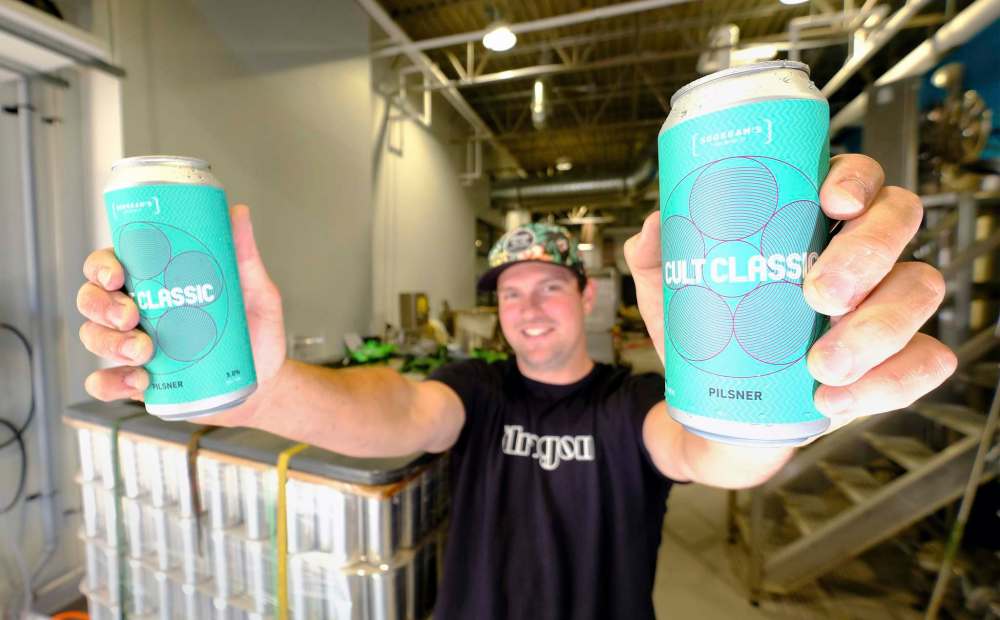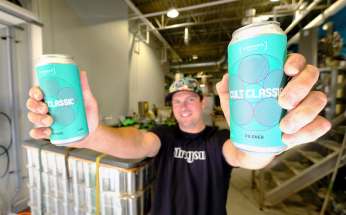Yes, he can Crafty businessman and his mobile canning service responsible for nearly a million cans of local craft beer
Read this article for free:
or
Already have an account? Log in here »
To continue reading, please subscribe:
Monthly Digital Subscription
$0 for the first 4 weeks*
- Enjoy unlimited reading on winnipegfreepress.com
- Read the E-Edition, our digital replica newspaper
- Access News Break, our award-winning app
- Play interactive puzzles
*No charge for 4 weeks then price increases to the regular rate of $19.00 plus GST every four weeks. Offer available to new and qualified returning subscribers only. Cancel any time.
Monthly Digital Subscription
$4.75/week*
- Enjoy unlimited reading on winnipegfreepress.com
- Read the E-Edition, our digital replica newspaper
- Access News Break, our award-winning app
- Play interactive puzzles
*Billed as $19 plus GST every four weeks. Cancel any time.
To continue reading, please subscribe:
Add Free Press access to your Brandon Sun subscription for only an additional
$1 for the first 4 weeks*
*Your next subscription payment will increase by $1.00 and you will be charged $16.99 plus GST for four weeks. After four weeks, your payment will increase to $23.99 plus GST every four weeks.
Read unlimited articles for free today:
or
Already have an account? Log in here »
Hey there, time traveller!
This article was published 21/06/2019 (2370 days ago), so information in it may no longer be current.
James Wells is not a brewer.
He doesn’t spend hours obsessing over choosing the right type of hops for his pale ale, nor does he create experimental batches with exotic ingredients in his spare time, like a mad scientist hoping to strike gold.
But despite the fact that Wells, a diesel mechanic by trade, has never crafted his own brew, over the past year, he’s been responsible for getting nearly a million cans of Winnipeg-made beer into Manitoba fridges and bellies.
How? It’s all in the can.
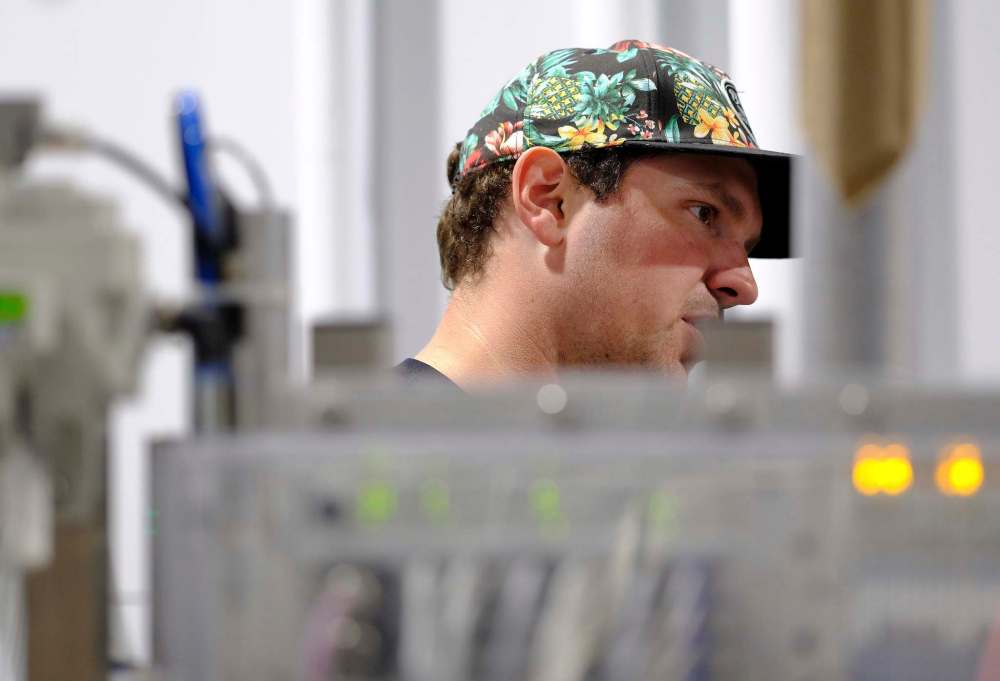
Last April, Wells, 27, quit his job repairing heavy machinery and purchased some of his own: a mobile canning line capable of filling up to 32 tallboys per minute, and since then, he’s hauled the device into most of the city’s craft microbreweries to help get their product on the shelf. By any measure, Mammoth Canning has been a mammoth success.
“Most people have no clue what I’m talking about when I say I do ‘mobile canning,’” said Wells on a recent Friday morning at Sookram’s Brewing Co., the city’s newest craft brewery. “But the general public doesn’t really need to know about me, as long as the breweries do.”
And know about him they do: Mammoth has canned for just about every brewery in the city, including Kilter, Devil May Care, Stone Angel, Nonsuch, Trans Canada, Barnhammer, and Sookram’s.
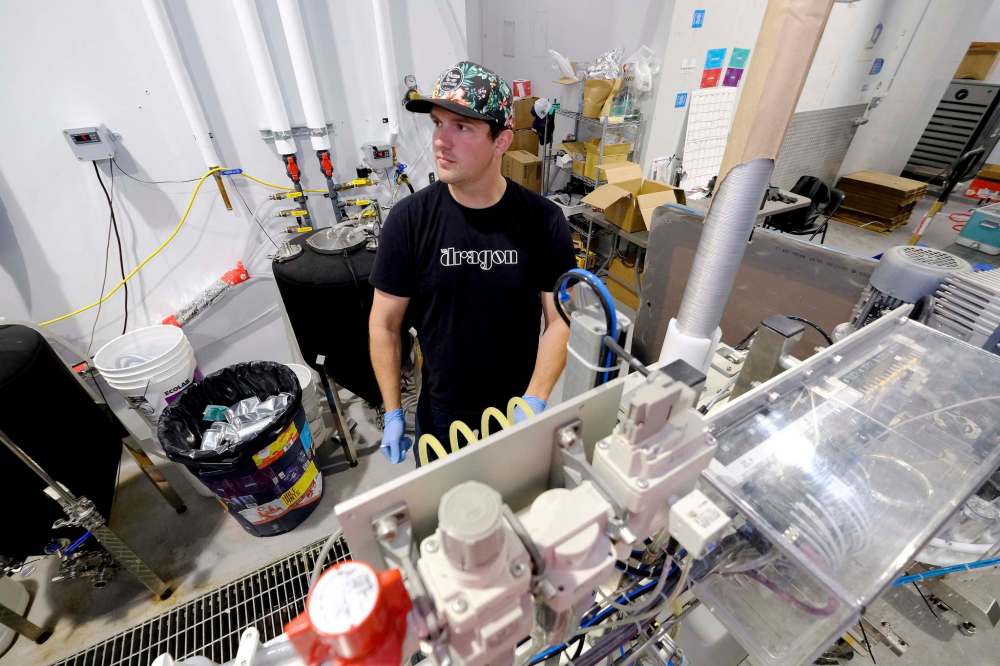
Wells said that prior to buying his canning line — he wouldn’t say how much it cost, but new machinery similar to it is often sold for between $150,000 and $200,000 — he conducted two years of research and planning, consulting industry professionals and breweries alike. What he found is that small start-up breweries often lacked the infrastructure or the capital to invest in a canning lane, and that the aluminum cans they sought to fill were only available to order by the truckload — about 150,000 empties.
Though mobile canners had begun operations in beer hotspots like British Columbia and Ontario, and over 30 had started up in the U.S., none existed between Toronto and Calgary, Wells realized, and he made plans to corner the Prairie market.
Then, it was all about biding his time. When the idea first came to him, in 2016, the province had just lifted regulations prohibiting taprooms, and the craft-brew scene was bone-dry. But by 2018, the city was nearing a beer-soaked critical mass, and Wells — with the help of co-owner Tyler Birch, an owner of Barnhammer Brewing Company — decided to put the line to work.
Now, the mobile unit is in use five days a week, booked about a month in advance, Wells said, with Mammoth holding 300,000 cans in its Keewatin Avenue warehouse and selling them back to breweries too small to store their own. Whether a Kilter Juicii New England IPA, a Nonsuch Cherry Chambiere, or a Sookram’s Cult Classic Pilsner, Wells says, “It’s all the same can.”
‘The general public doesn’t really need to know about me, as long as the breweries do’ – James Wells of Mammoth Canning
Owen Langley, the president of Oregon-based Creative Canning, an industry veteran who advised Wells early on, said that canning seems to be the future of craft beer in the U.S., which often indicates future trends in Canada.
“We have three bottling lines, and 17 can lines,” Langley said. “Let’s put it this way: I haven’t purchased a bottling line in four years.”
Indeed, according to Beer Canada, a national trade association, cans have overtaken glass bottles as the most popular beer vessel: in 2013, bottles made up about 44 per cent of total sales, compared to 46 per cent for cans. By 2018, 62 per cent of all beer in Canada was sold in cans, with 28 per cent in bottles.
Meanwhile, in Manitoba, the can was even more dominant, accounting for 73 per cent of total beer sales, compared to 19 per cent for bottles. In other words, Wells and Birch seem to have started up at exactly the right moment.
“I thought it was a great idea,” said Wells’ older brother, Jeremy, a former brewer at Half Pints and now the head brewer at Brazen Hall Kitchen & Brewery, which just purchased its own small canning line. “The nature of the mobile canning industry is that it’s a stop gap. Eventually people will buy their own lines, but new breweries and taprooms will keep opening, and keep using his business.”
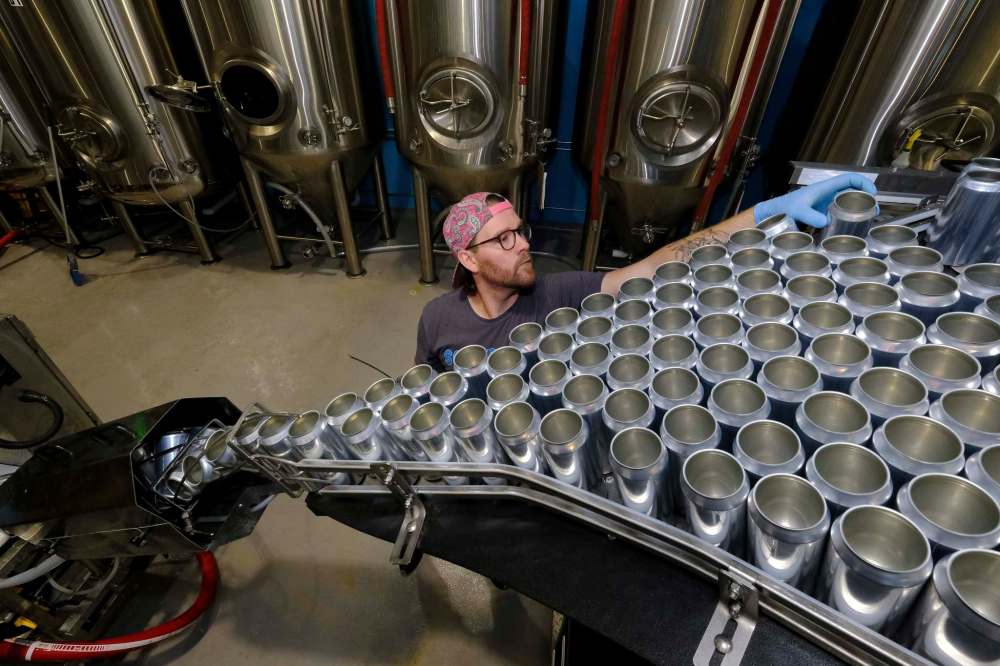
One of those new breweries is Sookram’s, which just opened its Osborne taproom this spring and began canning with Mammoth shortly thereafter. “He brings the whole operation to us,” said Andrew Sookram, the owner and president. “The cans come, and he does the rest.”
Wells arrived at Sookram’s recently for the company’s fifth canning run of its Cult Classic pilsner. Hauled in a massive trailer behind his pick-up truck, the mobile canning line is a site to behold, requiring about an hour to set it up and program it with proper carbonation levels and temperatures.
An elevator lifts up a pallet of cans to the top of a de-pal machine, which uses sensors to bring them to the proper height. Then, a sweeper pushes the cans forward and they bottleneck through what looks like an old steel lunchbox, and they’re flipped upside down into a helical swirl. Four cans at a time are sent onward, where four straws fill the cans with carbon dioxide to purge out oxygen, which drastically decreases shelf-life. In 4.5 seconds, each can is filled, bottom to top, a lid is affixed, any excess drippage is rinsed off, and finally, the pilsner is embraced by the hug of a teal Sookram’s label.
There you have it: a can of beer.
The machinery is highly intuitive and seemingly complex, but Wells — who used to repair excavators, dozers, and graters — nimbly manipulates the settings and makes it all look as easy as cracking open a cold one.
“It’s a pretty simple thing,” said Birch, who owns Barnhammer with his wife, Sable. “He goes, he cans, he leaves.”
Wells is also thinking of expansion opportunities. Mammoth has fielded offers and is researching entry into the kombucha and cold-brew coffee markets, as well as canned cocktails and teas, and elsewhere in the brewing world, Saskatchewan ranks near the top of the national rankings for breweries per capita, but has no mobile canning companies yet.
But for now, Winnipeg is keeping Mammoth plenty busy. Wells spent Monday at Barnhammer, Tuesday at Half Pints, Wednesday at Nonsuch, and Thursday and Friday at Trans Canada. He’s canning as fast as he can can.
business@freepress.mb.ca

Ben Waldman covers a little bit of everything for the Free Press.
Our newsroom depends on a growing audience of readers to power our journalism. If you are not a paid reader, please consider becoming a subscriber.
Our newsroom depends on its audience of readers to power our journalism. Thank you for your support.

